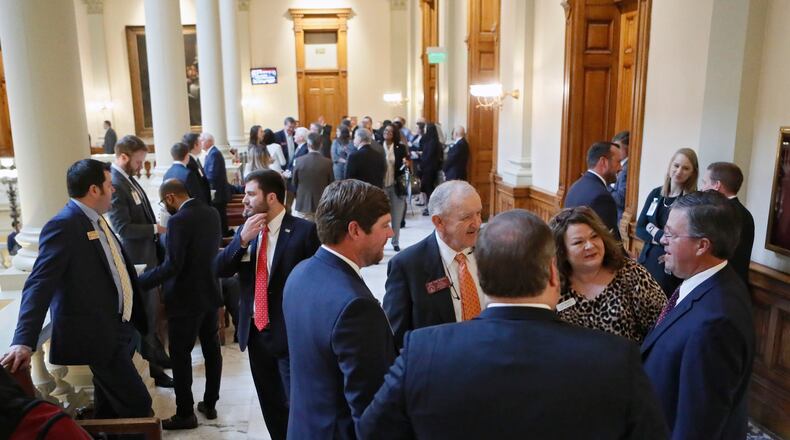The state Capitol is home to many untruths, some repeated so often that even the lawmakers who utter them mistake the phrases as gospel.
One of the most common is this: “We’re not here to pick winners and losers. We’re just here to create a level playing field.”
This is nonsense, of course. Ensuring winners and identifying losers is what the state Legislature, which convened again on Monday, is all about. For good and bad, better and worse. The more money at stake, the fiercer the fight. One lobbyist’s level playing field is another one’s cloud-scraping Matterhorn.
Take last week. The day had been a long one, and it was only on the drive home that I was able to reconnect – hands free — with a well-placed fellow worried about noises that state lawmakers had begun making – threatening to rein in Georgia’s generous system of tax credits for film and TV productions.
Two state audits had just found that the state Department of Economic Development had overstated the number of jobs film and TV companies had generated.
Lawmakers are being asked by Gov. Brian Kemp to cut hundreds of millions of dollars in state spending. Many are looking at the $870 million the state had given up to create a film and TV industry here. There is talk of limiting how many tax breaks are awarded.
“I was told by the head of a major studio — in his office, in California – that if Georgia ever mentioned the word ‘caps’ on the top end, it’d be over. They’d stop coming,” my contact said.
But if the state wanted to reduce the amount of cash it was giving up, he said, lawmakers should consider raising the $500,000 in spending that make production companies eligible for the tax credits.
Make the entry fee $5 million, he suggested. “Instead of messing with the top end, where there’s a clear benefit to the local community, you start with the bottom.”
Large film and TV production companies might be preserved – at the expense of small, independent operations. One group would win, one would lose.
Only a day later, Atlanta attorney Jeff Lewis sent a copy of a speech he had just delivered at a commercial real estate conference in Buckhead.
He told of a state Court of Appeals decision, made in October, that puts an eight-year limit on construction warranties – even those that say they're good for 20 years and more.
“This ruling could have a really negative effect on real estate development in Georgia, because it says that all your construction warranties are now dead after eight years,” Lewis said. “Apartment buildings, office buildings, shopping centers — it doesn’t matter. Single family, agricultural — any structure on any land in Georgia is apparently governed by this ruling.”
The state Supreme Court has been asked to reverse the decision. If it doesn’t, Lewis will head to the state Capitol to seek out his level playing field. Contractors will no doubt be there to argue for their own version.
A level playing field doesn’t always conform to logic.
A Senate panel with the ambitious name of Study Committee on Reducing Georgia’s Cost of Doing Business, chaired by John Wilkinson, R- Toccoa, wrapped up recently. Generally speaking, the aim of the committee was to make liability lawsuits less painful for businesses. Trial attorneys were all but declared enemies of the state.
The committee’s No. 1 recommendation was a $250,000 cap on punitive damages for product liability “in order to level the playing field.” Yes, it really said that.
The No. 2 recommendation was more interesting. Currently, in civil damage cases, state law forbids judges and juries from taking into account whether occupants in vehicle accidents were wearing seat belts. The Cost of Doing Business committee wants that restriction gone. Presumably, to reduce payouts from insurance companies. And because wearing a seat belt is important, right?
Under state law, adults in the back seats of vehicles aren’t required to be belted. But a second Senate panel is recommending that everyone in a vehicle be required to buckle up.
You’d think that this was a coordinated move. Apparently not. Lt. Gov. Geoff Duncan, president of the Senate, hedged when asked Monday if he supported the must-buckle measure. “I’d have to look at it,” Duncan said.
But if you really want to see the Legislature separate the winners from the losers, consider the gambling initiatives now floating around the state Capitol.
Gambling legislation hasn’t hit the floor of either chamber since the 1990s, when the Legislature proposed the constitutional amendment that ultimately named the state itself a winner — as the only entity that could legally conduct games of chance in Georgia.
For several years, a handful of lawmakers have pushed legislation that would allow “destination” gaming at a limited number of toney casinos. A large slice of the cash they generate could be put toward the HOPE scholarship program. Or rural hospitals.
But this year, casino proponents have competition. The Atlanta Braves, Atlanta Hawks, Atlanta Falcons, and Atlanta United are all backing legislation that would permit sports betting in Georgia.
Sports betting would be done on a smart phone, in a stadium, a bar or at home. No new neon-lit buildings would serve as an attraction for unsavory types, proponents argue.
Casino advocates point to more state revenue, and more job creation.
Very likely, there is bandwidth at the state Capitol for only one of these approaches. Which might mean that one must win, and the other must lose.
On the other hand, this is also an election year. Both could lose – but only on a very level playing field, naturally.
About the Author
The Latest
Featured




